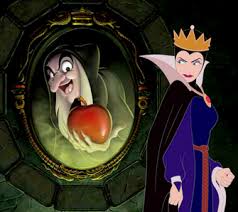Note: If you wish to receive, via e-mail, (1) my weekly newsletter or (2) daily copies of these posts, write to me at [email protected]. I’ll subscribe you via Mailchimp for the weekly and email you directly for the daily. Comments may also be sent to this address. I promise not to share your e-mail with anyone.
Wednesday
Earlier this year the blog lithub.com conducted a poll of their readers to determine the evilest character in literature. I’m not sure that George Orwell’s Big Brother would have won a couple of years ago, but with Donald Trump on everyone’s mind, the public chose the dictator. Orwell’s only mistake in his 1948 novel may be that he should have set his dystopian future 77 years into the future, not 36.
It was a fun contest with an impressive list of semi-finalists, representing respectively “Authority Figures” (Orwell’s O’Brien), “Monsters and Bogeymen” (Sauron), Manipulative Bastards (Hannibal Lecter), and Anti-Villains (Milton’s Satan). To reach that stage, O’Brien had to win out over Margaret Atwood’s Commander (in Handmaid’s Tale), Sauron over Joseph Conrad’s Kurtz, Lecter over Iago (who in turn had knocked out Lady Macbeth), and Satan over Euripides’s Medea. While, of this foursome, I would have chosen Satan because of the way he overrides the good that is in him, Big Brother O’Brien is a worthy winner.
Of my personal favorites that didn’t make the list, Richard Lovelace from Samuel Richardson’s Clarissa and John Fowles’s kidnapper from The Collector would rank high—in large part because I initially felt sympathetic towards them and so felt betrayed and doubly enraged for how they took me in. One character I would have ranked higher, pushing him at least to the semifinals, is John Holden from Cormac McCarthy’s Blood Meridian. Again, betrayal factors in here: in retelling American history as a story of bloodlust and genocidal slaughter, the Judge poses a major challenge to a cherished illusion that Americans have of themselves.
Interestingly, had he bested Stephen King’s Pennywise (from IT), the Judge would have faced Kurtz, who exploded Europe’s own cherished illusion that it was a civilizing Christian force. “This too has been one of the dark places,” narrator Marlow says. Maybe Holden seems more horrible to me than Kurtz because I’m an American so he strikes closer to home.
Most monstrous are those in whom we see something of ourselves. Walt Kelly famously wrote, “We have met the enemy and he is us,” and Freud revealed that what we consider uncanny or spooky is the shameful identification we sense and then repress. (“The return of the repressed” is how Freud explained it—or as the sci-fi film Forbidden Planet puts it, “monsters from the id.”) Literarily, this psychodrama may be most clearly laid out in The Strange Case of Dr. Jekyll and Mr. Hyde, where the good doctor’s attempt to repress his hydden self—“the maniac in the cellar”–only makes it stronger.
In Literary Hub’s playoff, incidentally, Hyde is ousted by King’s Randall Flagg (from The Stand) in the first round. I can’t really argue with that one, with Flagg operating essentially as America’s id. He attracts all the bad pandemic survivors to Las Vegas, after all, whereas all the good Americans gravitate to hippy heaven Boulder, Colorado.
When I taught fantasy literature, I used to challenge my students to examine the monster that scared or bothered them the most. There’s some part of that monster that is part of you and that will teach you about yourself, I told them. For me, I would recount, the scariest villain of all time has been Jack Torrance in The Shining, played by Jack Nicholson in the film. The reason: I had an inner anger that frightened me but that I denied was there. While I was never in danger of grabbing an axe and going after my wife and three sons, this repressed anger was something I needed to acknowledge and deal with. Once I did (through family counseling), the character lost his power over me and domestic life became more tranquil.
If the Literary Hub readers are any indication, we need to come to terms with the figure in our lives who keeps telling us that 2+2=5. The key is to see Trump for the insecure con man that he is rather than regarding him as an all-powerful and all-seeing Big Brother. The better we understand him, the more we are likely to find effective ways of combating him.


